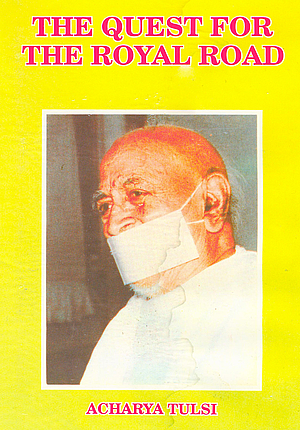Man is an active creature. But while being active, it is necessary to decide what should be done and what should not be done. Without that sense of discretion, action often becomes wrong action. Man does all kinds of things-the list is very long. Some of his actions are done automatically and for them no special provocation is needed. These include eating, playing, resting, etc.
But there are some actions that are not done without some inspiration. The first among them is keeping away from laziness and ruination. Addiction of any kind implies ruination. The person who is in the grip of addiction to intoxicant almost loses his consciousness. Even he does not know what needs to be done and what needs to be shunned. That is why, in the agamas it is said, "Awake, oh man. Do not get immersed in stupor."[1] Two things are necessary to keep away from stupor-stoppage and cleansing. The Jain philosophy has two terms to suggest the same meaning. They are sanvar and nirjara or stoppage. Sweeping whatever rubbish is already there is nirjara or cleansing.
For cleansing, the source of the rubbish would have to be first blocked. For that purpose, the scriptures have given a formula: I shall not do what I did in my stupified moments before.[2] By following this as a vow, prompt cleansing is possible. Otherwise how would the room he ever clean if rubbish keeps coming in while even cleaning is being done?
During my journeys on foot in Uttar Pradesh, an asthma patient came to me. He was coughing and breathing hard. He said, "Baba! I am ill and suffering a lot. Give me some medicine." I tried to convince him that I was not a physician. But when he still persisted, I asked, "Do you eat tobacco?" He said, "yes, I have been taking it for years!" I said, "If you wish to get well, first give up this addiction. Otherwise no medicine would do you any good."
Inspite of my hard persuasion, he was not willing to give up tobacco. How can any person expect to be healthy who is not able to give up an unhealthy habit? Excitement and anxiety result in ill health. One would require to give up excitement in order to be healthy. Only that person can give up excitement who has learnt to live into himself. Once man has learnt to live unto himself, he is automatically relieved of his tensions. Excitement and anxiety do not come anywhere near him. He is then able to live without any wories.
The person who does not probe into the future does not think about the past and lives without worry in the present is always healthy. One of man's problems is that he does not know how to live in the present. He is either lost in planning for the future or in pondering over the past.
The wife was waiting for her husband to come for lunch, but the husband was lost in some work. The wife felt bored after waiting long and finally went up to the husband to remind him about the lunch. The husband said, "Don't you know I am busy making provision for the next seven generations? I shall take a little more time." The wife felt sad and depressed of her husband's unnatural concern for the future.
When the husband came, the wife said to him, "Go and give this lunch to the sadhu in the neighbourhood." The husband was shocked. "She was hustling me all this time and now she wants me to go and give the food to that sadhu'" Feeling helpless, he took the food to the sadhu. But when he went there, the sadhu was in a state of elation. When that man offered him lunch the sadhu said, "I have already eaten. I don't need any food now."
Even after insisting when the sadhu did not agree, that man said, "What does it matter? Keep this food. You can eat in the evening." The sadhu said, "I am not worried about the evening, I live only in the present."
That remark left a deep impression on the mind of that man. He realised that his wife had sent him not to give food to the sadhu but to drive some sense in his own mind. How great that ascetic is, who was not worried about his evening meal? Whereas, he had even forgotten to eat in trying to make provision for his next seven generations:
In fact, living in the present is the characteristic mark of saintliness. The sravakas too should realise its full significance and give it its due place in life. I believe that any religion is to be identified not by manner of dressing, rituals, worship, etc. but by actual behaviour in life. Religion which is related to worship instead of being practised in life is no religion at all.
The best ascetic is he who does not get angry even when there is reason for it, who is not proud inspite of being learned, whose psychological deviation are under control and the mind is pure, who makes good use of his time. Other rules are subject to change and they are not very important.
It is the duty of every religious minded person to make religion part of life. Fortunately, we are able to have a religion which is simple and natural. There is no need for any great plans to be religious. All that is needed is to make life free of addictions and ambitions.
 Acharya Tulsi
Acharya Tulsi
